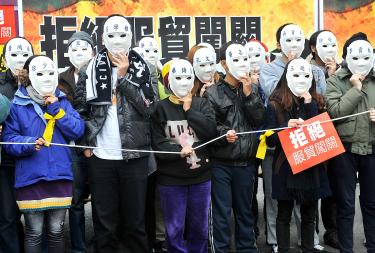Without a mechanism to regulate cross-strait negotiation and safeguard local industries, the livelihoods of millions of Taiwanese will be at stake if the government pushes the cross-strait service trade agreement between Taiwan and China through the legislature, hundreds of protesters said yesterday.
“If [the pact] is not screened clause-by-clause, we’ll fight to the very end,” Chen Chih-ming (陳志銘), president of the Kaohsiung Federation of Labor Unions, told protesters, who braved low temperatures and wind to gather in front of the Presidential Office on Ketagalan Boulevard in Taipei.
The protesters demanded that several pieces of legislation be passed to ensure transparency and democratic principles before the pact is screened by the Legislative Yuan.
They include a statute to regulate all agreements and treaties made between Taiwan and China; a bill to regulate incoming Chinese investment and workers; and a bill to institutionalize the impact assessment review of free trade.
Without such a safeguard mechanism, the jobs and wages of millions of local workers could suffer, particularly because neither local business sectors nor the legislature had been informed about the contents of the pact before it was signed in June, representatives who spoke at the rally said.
The potential negative impact of the deal has been a serious concern not only for workers, but also for students and youth rights advocates.
“The agreement could be summed up in two words: undemocratic and unfair,” said Chiu Yu-bin (邱毓斌), president of the Taiwan Association for Human Rights.
The signing of the pact was “not democratic” because neither the public nor the legislature had been consulted. The pact would only benefit large corporations, he said.
“I would say that the KMT has been kidnapped by those large corporations and the signing of the pact has launched a new wave of class struggle between rich and poor,” Chiu added.
Aphrodite Hung (洪瑞璞), spokesperson of the Black Island Nation Youth Front (黑色島國青年聯盟), said it was unfair to have the future of millions of Taiwanese decided by only a handful of business tycoons and an administration that has been doing nothing but what Beijing wanted from it since 2008, when President Ma Ying-jeou (馬英九) took office.
Although the KMT has withdrawn its original plan to forcibly pass the deal in an extra legislative session next month, the protesters remain suspicious, fearing that the party could launch an “ambush.”
KMT lawmakers refused to fill in a questionnaire prepared by the Democratic Front Against Cross-Strait Trade in Services Agreement, which asked every lawmaker to state his or her position on the protesters’ demands, alliance spokesperson Lai Chung-chiang (賴中強) said.
Only 44 of the 113 lawmakers filled in the questionnaire, with one coming from the People First Party, three from the Taiwan Solidarity Union and all 40 Democratic Progressive Party legislators, Lai said.
At a separate protest earlier, dozens of members of the Alliance of Referendum for Taiwan gathered in front of the legislature at noon, saying that the opposition should cite Article 16 of the Economic Cooperation Framework Agreement (ECFA) and demand the termination of the pact.
Under Article 16 of the ECFA, Taiwan and China would have to hold negotiations within 30 days after a side gives written notice of its intention to terminate the agreement.
Should there be a lack of consensus, each side must wait 180 days before the ECFA is terminated.
“Since the service trade pact is part of the ECFA, we assume that this would be the most effective way to stop the agreement,” alliance spokesperson Chang Ming-yu (張銘祐) said.
Source: Taipei Times - 2013/12/23





















